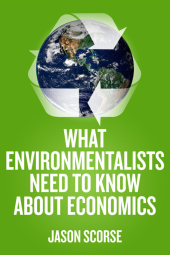 Neuerscheinungen 2010Stand: 2020-01-07 |
Schnellsuche
ISBN/Stichwort/Autor
|
Herderstraße 10
10625 Berlin
Tel.: 030 315 714 16
Fax 030 315 714 14
info@buchspektrum.de |

Jason Scorse
What Environmentalists Need to Know About Economics
2010. 2010. vi, 226 S. 8 SW-Abb. 216 mm
Verlag/Jahr: SPRINGER PALGRAVE MACMILLAN 2010
ISBN: 0-230-10731-1 (0230107311)
Neue ISBN: 978-0-230-10731-1 (9780230107311)
Preis und Lieferzeit: Bitte klicken
Easy-to-read and filled with real-world examples of the most complex environmental challenges, this book demonstrates that sound economic analysis and reasoning can be one of the environmental community´s strongest allies. This is sure to become an invaluable resource for students, environmental organizations, and policymakers.
KEY TITLE
Economic insights are essential to understanding the root causes of environmental problems and the policy options for how to change behavior at the individual, community, national, and international levels. What Environmentalists Need to Know about Economics Provides a conceptual set of tools for how to approach environmental issues in a rigorous and thoughtful manner, based on an analysis of incentives, property rights, market failure, supply and demand constraints, and insights from behavioral economics. Easy-to-read and filled with real-world examples of the most complex environmental challenges, this book demonstrates that sound economic analysis and reasoning can be one of the environmental community´s strongest allies. This is sure to become an invaluable resource for students, environmental organizations, and policymakers, on how economists view environmental problems and the ways to solve them.
What Environmentalists Need to Know about Economics provides a conceptual set of tools for how to approach environmental issues in a rigorous and thoughtful manner
Introduction PART I: HOW ECONOMISTS APPROACH ENVIRONMENTAL ISSUES The Root Causes of Environmental Problems Determining the ´Optimum´ Amount of Pollution Valuing Ecosystems Putting Monetary Values on the Environment and Living Things Valuing Future Generations Tools to Address Environmental Problems PART II: PUTTING ECONOMIC ANALYSIS TO WORK Climate Change Conservation and Biodiversity Preservation Agriculture Chemical Pollution Fisheries Deforestation Population Growth & Technological Change Demand-Side Interventions Final Thoughts& Additional Resources Comprehensive Reference List
JASON SCORSE Associate Professor and Chair of the International Environmental Policy Program at the Graduate School of International Policy and Management at the Monterey Institute of International Studies, USA.


